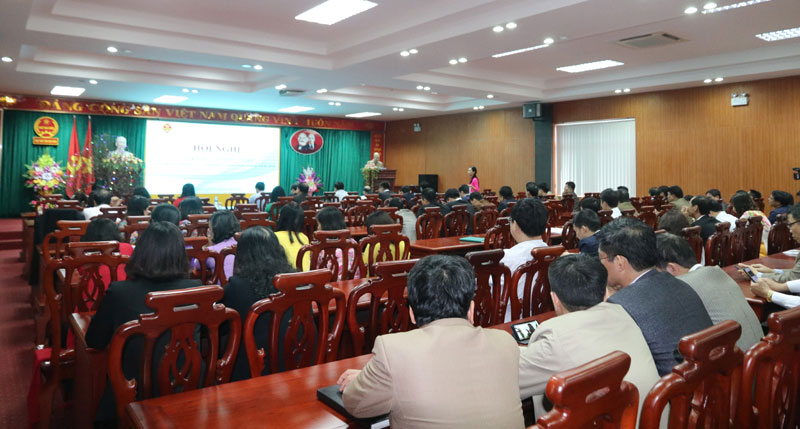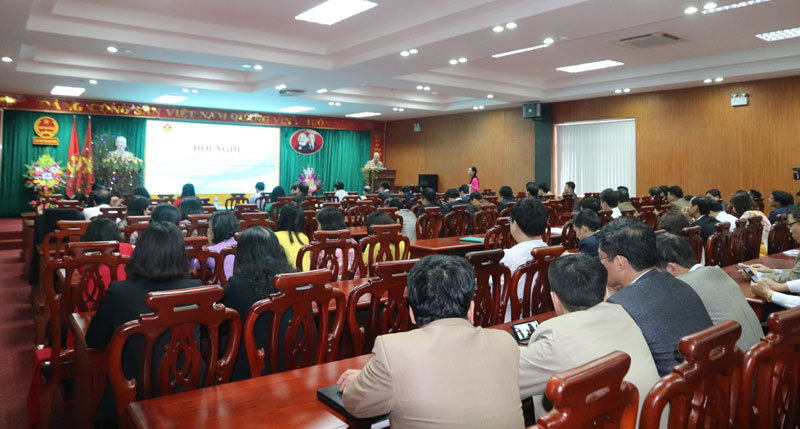
(HBO) – The Hoa Binh Department of Tax has held a conference to review its performance last year and launch major tasks in 2020, with Vice Chairman of the provincial People’s Committee Bui Duc Hinh in attendance.

A view of the conference.
According to
reports at the event, the province collected nearly 3.4 trillion VND in State
budget revenue in 2019, up 5 percent from the previous year and equivalent to
92 percent of the yearly plan
set by the provincial People’s Council.
Of the amount,
State budget collection from taxes and fees (exclusive of land use fee)
totalled nearly 2.71 trillion VND while revenue from land use fee exceeded 689
billion VND, a 2.6-fold increase year on year.
This year, theGovernment assigned the
department to collect over 4.26 trillion VND for the State budget while the
goal set by the provincialParty’s Committee and People’s Council is 4.78 trillion VND. The department has
adopted four major tasks and four groups of solutions in order to fulfil the
goals.
Speaking at
the event, Vice Chairman Hinh highly spoke of the efforts by the tax department
to fulfill the goals last year in the face of multiple socio-economic
challenges.
He asked the
department to continue ramping up communications and education on tax policies
and procedures at all stages, units and sectors. He also ordered it to closely
coordinate with local authorities and other departments in State budget
collection and strengthen inspection to prevent losses.
It must also
advise the provincial People’s Committee on ways to help businesses tackle difficulties, attract investment
and organize land auctions.
to boost local economy and create sustainable sources for tax and fee collection, Hinh said.
He assigned the
department to collect at least 2.5 trillion VND for the State budget by June,
2020 and 5 trillion VND by the end of the year./.
According to data from the Hoa Binh Provincial Party Committee, the industrial production index for the first six months of 2025 is estimated to have increased by 20% compared to the same period last year. This marks the highest year-on-year growth rate for this period since 2020.
In the first six months of 2025, Hoa Binh province’s export turnover was estimated at 1.145 billion USD, marking an 18.11% increase compared to the same period in 2024. Import turnover was estimated at $ 804 million, a 17.15% increase, which helped the province maintain a positive trade balance.
The lives of the ethnic minority farmers in Tan Lac district have gradually improved thanks to the new directions in agricultural production. This is a testament to the collective strength fostered through the professional associations and groups implemented by various levels of the district’s Farmers’ Union.
With the motto the "product quality comes first,” after nearly one year of establishment and operation, Muong village’s Clean Food Agricultural and Commercial Cooperative, located in Cau Hamlet, Hung Son Commune (Kim Boi district), has launched reputable, high-quality agricultural products to the market that are well-received by consumers. The products such as Muong village’s pork sausage, salt-cured chicken, and salt-cured pork hocks have gradually carved out a place in the market and they are on the path to obtaining the OCOP certification.
In the past, the phrase "bumper harvest, rock-bottom prices" was a familiar refrain for Vietnamese farmers engaged in fragmented, small-scale agriculture. But today, a new spirit is emerging across rural areas of Hoa Binh province - one of collaboration, organisation, and collective economic models that provide a stable foundation for production.
Maintaining growing area codes and packing facility codes in accordance with regulations is a mandatory requirement for agricultural products to be eligible for export. Recently, the Department of Agriculture and Environment of Hoa Binh province has intensified technical supervision of designated farming areas and packing facilities to safeguard the "green passport" that enables its products to access international markets.



